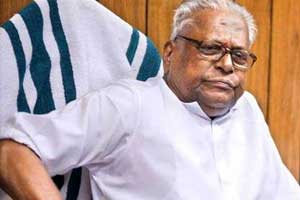
Kochi, December 6: In a relief to former Chief Minister and veteran CPI(M) leader V S Achuthanandan, the Kerala High Court today quashed the FIR against him in a land allotment issue, holding that framing a case against him on "false and frivolous" charges was unworthy of any merit.
The court said some features presented in the case were "too disturbing", that in fact "gives enough room to generate" suspicion that the machinery of vigilance is misused and abused to silence political opponents."
Justice S S Sateeshchandran, in his 64 page order, quashed the FIR against Achuthanandan, the first accused in the case, and all further proceedings against him.
The case pertains to alleged violation of norms while allotting 2.33 acres of land to T K Soman, an ex-serviceman and Achuthanandan's close relative, in Kasaragod district when he was Chief Minister heading the LDF ministry during 2006-11.
Apart from the 88-year-old leader, his personal assistant Suresh and former Revenue Minister K P Rajendran (CPI) and a couple of officials have been listed as accused in the FIR filed in a court in Kozhikode after a vigilance probe found prima facie evidence.
Achuthanandan had filed a petition, seeking quashing of the FIR.
Reacting to the verdict, Achuthanandnan said in Thiruvananthapuram that it was a 'mortal blow' to Congress-led UDF Government and its attempts to frame him in a corruption case.
Chief Minister Oommen Chandy said government would go ahead with legal proceedings in the case and denied it had interfered in the case with political intentions.
Victory of "truth and justice" Achuthanandan
Terming the Kerala High Court order quashing the FIR against him in a land-gift case as 'a victory of truth and justice,' former Chief Minister and CPI(M) veteran V S Achuthnandnan today said it was a 'mortal blow' to the Congress-led UDF government to frame him in a corruption case.
Reacting to the politically significant case, Chief Minister Oommen Chandy said his government would go ahead with legal proceedings in the case and denied having interfered in the case with political intentions.
Significantly, the order came when the government was moving ahead with plans to file a charge sheet in the case and seek the Governor's assent to prosecute Achuthanandan.
Welcoming the order, Achuthanandan also had a veiled dig at his CPI(M) detractors, saying the case was a conspiracy by Chandy and Muslim League leader and Industries Minister P K Kunhalikutty to remove him as Leader of the Opposition in the Assembly and install someone else in that position.
Talking to reporters here, the 88-year-old leader said details of the conspiracy would soon surface, adding, "you (media) can also perform your role in unearthing the entire conspiracy."
Rejecting Achuthanandan's charge, Chandy said the government had at no stage intervened in the case with political intentions and had always taken the stand that the law would take its own course.
On Achuthanandan's charge that there was a conspiracy to remove him as opposition leader, Chandy said "it is not the Congress that decides who should be leader of LDF opposition."
Meanwhile, CPI state secretary Panniyan Raveendram asked the government to resign in view of the order and said the decision vindicated the LDF stand that the case was politically motivated and a move to tarnish Achuthanandan's image as a crusader against corruption.





Comments
Add new comment